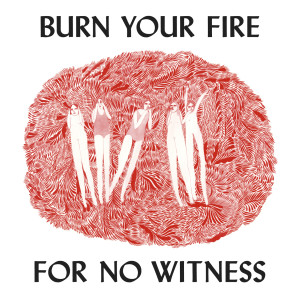 “I feel so lonesome I could cry,” Angel Olsen sings in the first line of “Hi-Five,” the first single off her new album Burn Your Fire For No Witness. It is an apparent reference to Hank Williams, although she warbles the line in a style more reminiscent of Roy Orbison. “But instead I’ll pass the time / sitting lonely with somebody lonely too,” she continues. She goes on to create a bleak portrait of somebody willing to settle for somebody who only sometimes feels the same way she does. And her amazingly supple and versatile voice cycles through styles that echo not just Hank and Roy, but Patsy Cline, Patty Smith and possibly more that I’ve missed. All that means, in the end, is that Angel Olsen sounds like nobody but herself, and that’s a grand thing.
“I feel so lonesome I could cry,” Angel Olsen sings in the first line of “Hi-Five,” the first single off her new album Burn Your Fire For No Witness. It is an apparent reference to Hank Williams, although she warbles the line in a style more reminiscent of Roy Orbison. “But instead I’ll pass the time / sitting lonely with somebody lonely too,” she continues. She goes on to create a bleak portrait of somebody willing to settle for somebody who only sometimes feels the same way she does. And her amazingly supple and versatile voice cycles through styles that echo not just Hank and Roy, but Patsy Cline, Patty Smith and possibly more that I’ve missed. All that means, in the end, is that Angel Olsen sounds like nobody but herself, and that’s a grand thing.
The Americana references are fewer and farther between on this album than on her previous, 2012’s Half Way Home. She has moved up to a bigger indie label for this outing, and employs a new band with Josh Jaeger on drums and Stewart Bronaugh on bass, fully fleshing out the sound behind her guitar work, which like her lyrics and vocal stylings ranges from country to folk to fuzzed-out indie rock and more.
Burn Your Fire is one of the saddest albums I’ve heard since The Everybodyfields’ 2007 breakup album Nothing Is Okay. Not even excepting the ironic, slightly arch finale to “Hi-Five,” every song on this album delves into themes of loneliness, alienation, and frustration toward love that seems to have gone wrong at every turn. Sometimes the setting is confessional country folk like “Lights Out,” where the singer tries to get her lover to commit to anything, whether it’s leaving or staying. Her voice drifts in and out of clarity on the verses to distortion on the choruses, as she sings lines like “If you don’t feel good about it, then turn around / if you really mean it baby, stand your ground.” Again in confessional mode on “Iota,” accompanied only by a hushed acoustic guitar and lightly brushed snare, Olsen delivers sing-song lyrics that flirt with ‘70s hippiedom (“if all the world could see it with one eye, in perfect color to the prefect sky”) until she arrives at the mordant center of the song (“if only we got wiser with each breath, if only we could dance our way to death …”).
And then sometimes Olsen and the band turn up the volume and rock, as on the second track “Forgiven/Forgotten.” It’s a lament of lost love but it’s as short and driving as a hardcore punk song at barely two minutes, arriving quickly at the third verse in which she asks, amid a squall of strangled guitar notes, “will you forgive me … for loving you?” “High & Wild” is a mid-tempo rocker that somehow combines the feels of classic country and ‘60s girl-group rock. In tone, though, it’s more of a garage rock song of lost love that starts “you’re gone, you’re gone, you’re with me but you’re gone…”
The album’s thematic center is in the seven-minute ode to alienation “White Fire,” which contains the album’s title among its lyrics – lyrics like “everything is tragic, it all just falls apart / when I look into your eyes at pieces of my heart,” set to spare accompaniment of fingerpicked, distorted electric guitar and a light electronic keyboard drone. But don’t ignore the final track, another song that starts out quiet and languid, again with a plea to a lover with whom she can’t quite connect: “Won’t you open a window sometime, what’s so wrong with the light? Wind in your hair, sun in your eyes …” The accompaniment swells to a noisy crescendo of piano, guitars, drums and her repeated sighing question that brings the album to a close, “what’s so wrong with the light?”
Though Olson sometimes uses her delivery to pretend indifference, the lyrics of these songs testify otherwise. If you listen closely, Burn Your Fire For No Witness is a painfully brave album. I find it equally comforting and disturbing. That’s one definition of art, isn’t it?
Here’s a revealing solo performance in one of NPR’s “Tiny Desk Concerts.”
(Jagjaguwar, 2014)
